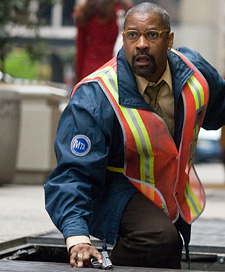 The taking of Pelham 123 begins as a straightforward hostage drama, but quickly develops into a struggle between two men who have both suffered at the hands of the people they sought to serve. One seeks revenge, the other redemption. The difference between them is their willingness to admit their guilt.
The taking of Pelham 123 begins as a straightforward hostage drama, but quickly develops into a struggle between two men who have both suffered at the hands of the people they sought to serve. One seeks revenge, the other redemption. The difference between them is their willingness to admit their guilt.
The taking of Pelham 123 is based on a best-seller by John Cody and a remake of a 1974 classic originally starring Walter Matthau and Robert Shaw. It was also made into a moderately successful tele-movie in 1998, so director Tony Scott was going to have to do more than introduce new faces to have a chance at delivering a box office success. Scott's answer was to shift the focus away from the hostage crisis on to the moral tension between the film's two main characters.
Denzel Washington plays Walter Garber, a train dispatcher who is under investigation for taking a bribe from a Japanese train manufacturer. John Travolta plays Ryder, a conniving killer who hijacks one of the subway trains under Garber's care. Garber is only handling the dispatch desk that day because he is being victimized by a transport service that wants this tainted worker gone; Ryder it turns out is a former stock broker who went to prison for the way he handled the city employees' pensions.
This latest version of The taking of Pelham 123 centres on both men's sense of entitlement. Ryder is enraged at his perception of the wrongs he has suffered, and his focus on the guilt of others drives him to treat his victims mercilessly. He tells Garber, "A good catholic knows no-one is innocent." Whereas Garber is forced to admit that he deserves the punishment he has received: "The MTA didn't do this to me; I did it to myself." Their reactions to the situations they find themselves in are remarkably similar to the thieves on either side of the cross. Both suffer from their circumstances; only one can see the role he has played in bringing them on himself.
Both Garber and Ryder acknowledge God requires justice, and that His standards are costly:
Ryder: We all owe God a death and I'm a man who pays his debts.
Gerber: I don’t know what you owe God but you can’t pay him in cash. There are no U-hauls behind hearses. The Egyptians tried that and it didn't work.
Gerber is a man who is constantly seeking redemption. He places himself in the firing line again and again, not because he has to but because he somehow wishes to make up for the betrayal his bribery represented. However the more he seeks to do, the more is required of him; redemption is at every point far harder than he expected. Predictably, though, his heroic efforts earn him the forgiveness of the city he let down. It seems that as a culture we understand that the redemption of a human being even in this life is something that requires such an incredible effort that only the truly heroic could hope to achieve it. And so Gerber regains the respect of his fellow citizens, but how he stands with God at the end of the film remains a moot point.



























